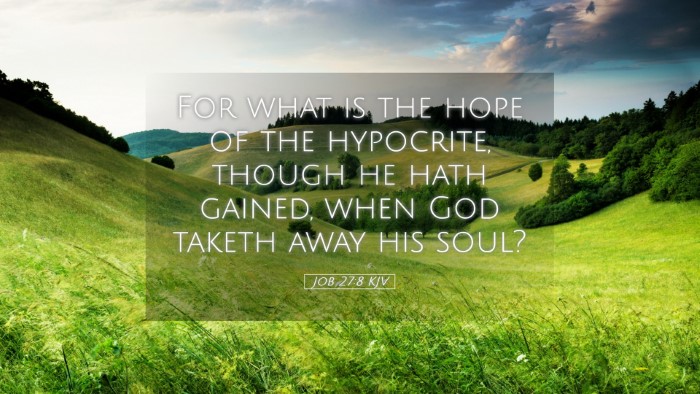Old Testament
Genesis Exodus Leviticus Numbers Deuteronomy Joshua Judges Ruth 1 Samuel 2 Samuel 1 Kings 2 Kings 1 Chronicles 2 Chronicles Ezra Nehemiah Esther Job Psalms Proverbs Ecclesiastes Song of Solomon Isaiah Jeremiah Lamentations Ezekiel Daniel Hosea Joel Amos Obadiah Jonah Micah Nahum Habakkuk Zephaniah Haggai Zechariah MalachiJob 27:8
Job 27:8 KJV
For what is the hope of the hypocrite, though he hath gained, when God taketh away his soul?
Job 27:8 Bible Commentary
Commentary on Job 27:8
Job 27:8 states: "For what is our lot from God above, our heritage from the Almighty on high?" This verse addresses profound questions about divine justice, human suffering, and the nature of hope in the face of adversity. In exploring this verse, we draw insights from notable public domain commentaries, including those of Matthew Henry, Albert Barnes, and Adam Clarke.
Contextual Background
The Book of Job presents a narrative of suffering, righteousness, and the struggle with theodicy. Job, described as a blameless and upright man, grapples with his understanding of suffering and God's justice. This particular verse emerges from a discourse where Job asserts his integrity amidst accusations and the philosophical arguments of his friends. He contemplates the fate of the wicked versus the righteous, seeking to formulate a proper understanding of his situation before God.
Insights from Matthew Henry
Matthew Henry highlights that Job’s inquiry into his "lot" signifies a search for truth regarding divine Providence. He asserts that understanding our inheritance from God is essential in recognizing the broader aspect of divine justice:
- Divine Sovereignty: Henry emphasizes that God's authority overshadows human circumstance. He reminds us that earthly sufferings do not diminish God’s sovereignty; rather, they form part of His greater plan.
- Expectation of Justice: The perspective offered by Henry is one of hope. Despite Job's current distress, he argues for a belief in ultimate justice, wherein the faithful will receive their rightful reward.
- Moral Responsibility: Henry urges readers to maintain their integrity, suggesting that Job’s challenge is a reminder of moral responsibility before God, reinforcing that one's actions have eternal significance.
Insights from Albert Barnes
According to Albert Barnes, Job's rhetorical question about his "lot" articulates a critical theological inquiry into the nature of divine gifts and our response to suffering:
- Evaluation of Riches and Blessings: Barnes draws attention to the contrast between worldly wealth and spiritual inheritance. He posits that our "lot" from God transcends material possessions and points towards a more significant spiritual legacy.
- Theological Implications: He discusses the implications of Job's statement on the nature of human beings in relation to God. Understanding our divine inheritance instills a sense of responsibility to live righteously.
- Perseverance in Affliction: Barnes comments on the necessity of perseverance. Job's faith serves as a model for enduring trials with the conviction of future redemption, underscoring that God's justice will ultimately prevail.
Insights from Adam Clarke
Adam Clarke provides a more detailed exploration of the language and implications of the verse, offering a nuanced perspective that binds together exegesis and practical application:
- Cultural Context: Clarke elaborates on the cultural implications of "heritage" in the ancient Near Eastern context. He indicates that heritage implies a relationship with God that is permanent and irrevocable, revealing human reliance on divine generosity.
- The Role of Suffering: He discusses suffering as a critical element in the believer's life, proposing that it can ultimately lead to deeper faith and understanding of divine grace.
- Call to Reflection: Clarke urges believers to reflect on their own spiritual inheritance. He suggests that believers should evaluate their lives against the backdrop of God’s provision and grace, which surpasses earthly afflictions.
Theological Themes
In synthesizing these commentaries, we can derive several theological themes central to Job 27:8:
- The Nature of God’s Justice: The text challenges readers to consider the balance between divine justice and human suffering.
- Hope amidst Despair: There exists a recurrent theme of hope within suffering circumstances, encouraging believers to trust in God’s ultimate plan.
- Integrity and Righteousness: Job’s adherence to his beliefs sheds light on the importance of maintaining moral integrity, particularly in times of adversity.
- Understanding Divine Providence: The verse prompts contemplation on how divine providence shapes the experiences of faith and the human condition.
Practical Applications
The implications of Job 27:8 resonate deeply with pastors, students, theologians, and scholars. It calls for a discerning approach to both teaching and personal faith:
- Pastoral Care: Pastors can utilize this text to encourage congregants facing suffering, reminding them of the eternal perspective that God holds.
- Academic Study: Theologians can engage in discussions concerning theodicy and divine justice as presented in Job, utilizing it in sermon preparation and theological discourse.
- Personal Spiritual Reflection: Students of the Scripture are invited to deeply consider their spiritual inheritance and how their faith informs their response to life's trials.
Conclusion
Job 27:8 serves as a profound reminder of the human condition in relation to divine justice and spiritual inheritance. It compels the faithful to reflect upon their response to suffering, the assurance of God’s providence, and the nature of their moral integrity. Through the combined insights of Henry, Barnes, and Clarke, we gain a rich tapestry of understanding that deepens our appreciation for this pivotal moment in the narrative of Job.


